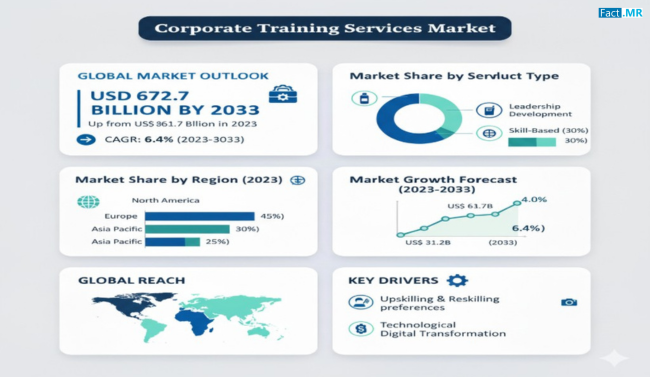The modern corporate landscape is rapidly evolving, requiring businesses to continuously upskill their workforce to stay competitive. Corporate training services have emerged as a vital tool for organizations seeking to enhance employee performance, bridge skill gaps, and foster professional development. These services, encompassing instructor-led programs, online modules, workshops, and certification courses, are increasingly essential in a hybrid and remote work environment where traditional training methods are often insufficient.
Rising demand for digital learning, technological integration, and flexible training models has transformed corporate training from a periodic activity into a continuous process that aligns with organizational objectives. Companies across industries are recognizing that investing in employee training not only improves productivity but also enhances employee engagement and retention.
Market Overview
Corporate training services include a wide array of programs designed to enhance technical skills, leadership capabilities, and soft skills. Key offerings range from management development, information and communication technology (ICT) training, to specialized certification programs. The increasing complexity of business operations and rapid technological advancement are driving organizations to adopt advanced training methodologies.
Digital learning platforms, virtual classrooms, webinars, and AI-based learning modules are reshaping how organizations deliver training. These solutions provide cost-effective, scalable, and flexible learning experiences, allowing employees to develop skills at their own pace while minimizing disruptions to workflow. Additionally, data-driven insights from these platforms help organizations identify skill gaps, monitor progress, and tailor training programs to specific needs.
Regional Insights
North America leads in corporate training adoption due to the presence of a robust corporate ecosystem, widespread technology integration, and strong focus on employee development. Organizations leverage advanced training platforms and blended learning approaches to address skill gaps efficiently.
Europe shows significant growth with a strong emphasis on regulatory compliance, professional certifications, and workforce development. Countries such as the U.K., Germany, and France are early adopters of advanced corporate training solutions and e-learning platforms.
Asia-Pacific is emerging as a high-growth region due to rapid industrialization, growing corporate sectors, and a large labor force. Countries like China, India, and Japan are witnessing increased demand for scalable, tech-driven training programs that support hybrid work models.
Regions such as Latin America and the Middle East & Africa are gradually adopting corporate training services as businesses recognize the benefits of continuous workforce development and digital learning solutions.
Key Trends and Forecast
- Hybrid and Remote Training Models
The rise of remote and hybrid work has necessitated flexible training solutions. Virtual classrooms, webinars, and video conferencing are widely used to ensure employees receive continuous learning despite location constraints. - Integration of AI and Machine Learning
Artificial intelligence and machine learning are enabling personalized learning experiences, smart course recommendations, and performance tracking. These technologies enhance learning outcomes and make training more efficient. - Focus on Skills Development
Organizations are prioritizing upskilling and reskilling programs to address emerging skill gaps. Training in ICT, leadership, and professional certifications are increasingly in demand. - Cost-Efficient Learning Solutions
Digital platforms reduce expenses related to travel, lodging, and infrastructure while providing scalable solutions that reach a larger workforce. - Industry-Specific Training Programs
Tailored training solutions are being developed to meet sector-specific requirements, such as compliance training in finance, technical skills in IT, and leadership programs in manufacturing and service sectors.
Applications and End-Use Outlook
Corporate training services serve multiple functions across organizations:
- Skill Enhancement: Employees gain proficiency in technical, managerial, and soft skills, boosting productivity and performance.
- Leadership Development: Programs focus on nurturing leadership capabilities to prepare mid-level and senior employees for managerial roles.
- Compliance and Regulatory Training: Ensures employees are well-versed in industry regulations, reducing risks and enhancing organizational reputation.
- Technology Adoption: ICT training and digital skill development programs facilitate the adoption of new tools and platforms, enabling businesses to stay competitive.
This diverse utility underscores the importance of corporate training in achieving organizational growth, workforce efficiency, and employee satisfaction.
Challenges and Opportunities
Despite its growth, the corporate training services market faces challenges such as high costs, time constraints, and varying employee engagement levels. Scheduling training without affecting productivity and providing access to consistent learning experiences across geographically dispersed teams are ongoing concerns.
However, opportunities abound in digital learning, AI-driven personalized training, and blended learning models. Companies that offer innovative, cost-effective, and scalable solutions can tap into the growing demand for continuous workforce development. The adoption of mobile learning apps, gamified modules, and analytics-driven content also presents significant growth potential.
Conclusion
The corporate training services market is evolving rapidly, driven by the need for continuous employee development, technological integration, and flexible learning solutions. Businesses investing in corporate training can enhance workforce skills, improve performance, and foster a culture of lifelong learning.
As organizations navigate hybrid work models, technological changes, and increasing competition, corporate training services provide a strategic advantage by aligning employee capabilities with organizational objectives. The future of corporate training lies in personalized, scalable, and technology-enabled solutions that empower employees while driving overall business success.
Browse Full Report – https://www.factmr.com/report/67/hair-grooming-market


